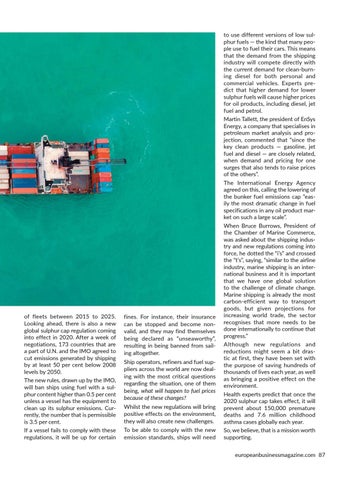of fleets between 2015 to 2025. Looking ahead, there is also a new global sulphur cap regulation coming into effect in 2020. After a week of negotiations, 173 countries that are a part of U.N. and the IMO agreed to cut emissions generated by shipping by at least 50 per cent below 2008 levels by 2050. The new rules, drawn up by the IMO, will ban ships using fuel with a sulphur content higher than 0.5 per cent unless a vessel has the equipment to clean up its sulphur emissions. Currently, the number that is permissible is 3.5 per cent. If a vessel fails to comply with these regulations, it will be up for certain
fines. For instance, their insurance can be stopped and become nonvalid, and they may find themselves being declared as “unseaworthy”, resulting in being banned from sailing altogether. Ship operators, refiners and fuel suppliers across the world are now dealing with the most critical questions regarding the situation, one of them being, what will happen to fuel prices because of these changes? Whilst the new regulations will bring positive effects on the environment, they will also create new challenges. To be able to comply with the new emission standards, ships will need
to use different versions of low sulphur fuels — the kind that many people use to fuel their cars. This means that the demand from the shipping industry will compete directly with the current demand for clean-burning diesel for both personal and commercial vehicles. Experts predict that higher demand for lower sulphur fuels will cause higher prices for oil products, including diesel, jet fuel and petrol. Martin Tallett, the president of EnSys Energy, a company that specialises in petroleum market analysis and projection, commented that “since the key clean products — gasoline, jet fuel and diesel — are closely related, when demand and pricing for one surges that also tends to raise prices of the others”. The International Energy Agency agreed on this, calling the lowering of the bunker fuel emissions cap “easily the most dramatic change in fuel specifications in any oil product market on such a large scale”. When Bruce Burrows, President of the Chamber of Marine Commerce, was asked about the shipping industry and new regulations coming into force, he dotted the “i’s” and crossed the “t’s”, saying, “similar to the airline industry, marine shipping is an international business and it is important that we have one global solution to the challenge of climate change. Marine shipping is already the most carbon-efficient way to transport goods, but given projections for increasing world trade, the sector recognises that more needs to be done internationally to continue that progress.” Although new regulations and reductions might seem a bit drastic at first, they have been set with the purpose of saving hundreds of thousands of lives each year, as well as bringing a positive effect on the environment. Health experts predict that once the 2020 sulphur cap takes effect, it will prevent about 150,000 premature deaths and 7.6 million childhood asthma cases globally each year. So, we believe, that is a mission worth supporting. europeanbusinessmagazine.com 87
